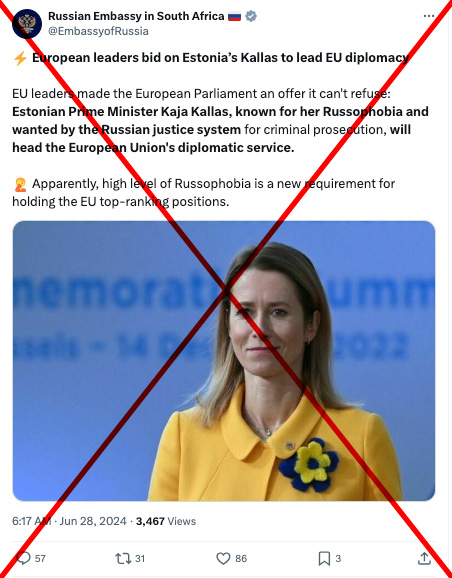 The Claim:
The Claim:
The Russian Ministry of Foreign Affairs has reacted to the election of Estonian Prime Minister, Kaja Kallas, by accusing her of “Russophobia” and of being “wanted by the Russian justice system of criminal prosecution”.
The Facts:
The Kremlin has historically accused anyone or any group critical of its policies of “Russophobia” to malign the targets of this accusation and to position the Russian government and people as victims. Kaja Kallas has been critical of the Kremlin and Vladimir Putin, but there is no evidence to suggest that she is anti-Russian.
Additionally, the Russian government has placed Ms. Kallas on Russia’s “wanted list” for her government’s efforts to relocate Soviet-era memorials that glorify Russia’s Soviet-era colonization of Estonia and its policies of political and ethnic repression. The Estonian government has every right to secure and ensure that historical facts and truths about Russian Soviet-era repression and terror are known. Russia has no right to manipulate, distort, or impose its warped versions of history on other nations.
The accusations made by the Russian Ministry of Foreign Affairs are consistent with its regular provocation of hatred towards critics based on ethnic background and its promotion of intolerance towards minorities, including women.
Narrative Context:
Why is Kaja Kallas Being Targeted?
Ms. Kallas is known for her strong pro-European Union and pro-NATO positions. Estonia, like other Baltic states, has been critical of Russian actions, particularly the annexation of Crimea and the ongoing conflict in Ukraine. By targeting Ms. Kallas, Russia aims to discredit and undermine a prominent critic within the EU and NATO and diminish her influence.
The Putin regime has systematically reduced women’s rights in Russia over the past two decades. Domestic violence in Russia was decriminalized in 2017. Furthermore, the LGBTQ community has been designated an “extremist group” by the Kremlin.
Estonia represents a success story of post-colonial reintegration into Western democratic political and economic structures. Attacking Kallas is symbolic, as it indirectly challenges the values and successes of nations formally colonized by Soviet era Russia aligning with the West.
Use of the Term “Russophobia” to Deflect and Delegitmize.
The term “Russophobia” has been historically used by the Kremlin to delegitimize genuine criticism of Russian policies by framing it as irrational prejudice. This rhetorical strategy aims to deflect attention from the substance of the criticism (e.g., human rights abuses, aggressive foreign policies) and instead portrays the critics as being biased or bigoted against all Russians.
Domestically, the Kremlin uses the term to rally nationalist sentiment and incite hate towards those who are critical of Russia. It portrays Russia as being under siege from hostile foreign actors. Internationally, it seeks to create a narrative of victimization, attempting to gain sympathy or at least muddy the waters regarding legitimate criticism.
By labeling opponents as “Russophobes,” Russia also seeks to polarize public opinion, forcing individuals and states into defensive positions. This tactic can weaken international solidarity against Russian policies by turning the conversation towards accusations of bias rather than focusing on the actions being criticized.
By maligning Kaja Kallas and deploying the term “Russophobia,” Russia aims to undermine critics, deflect legitimate criticisms, and foster a narrative of unjust persecution. This strategy serves both domestic propaganda purposes and attempts to influence international perceptions, complicating efforts to address and counteract Russian policies and actions.

